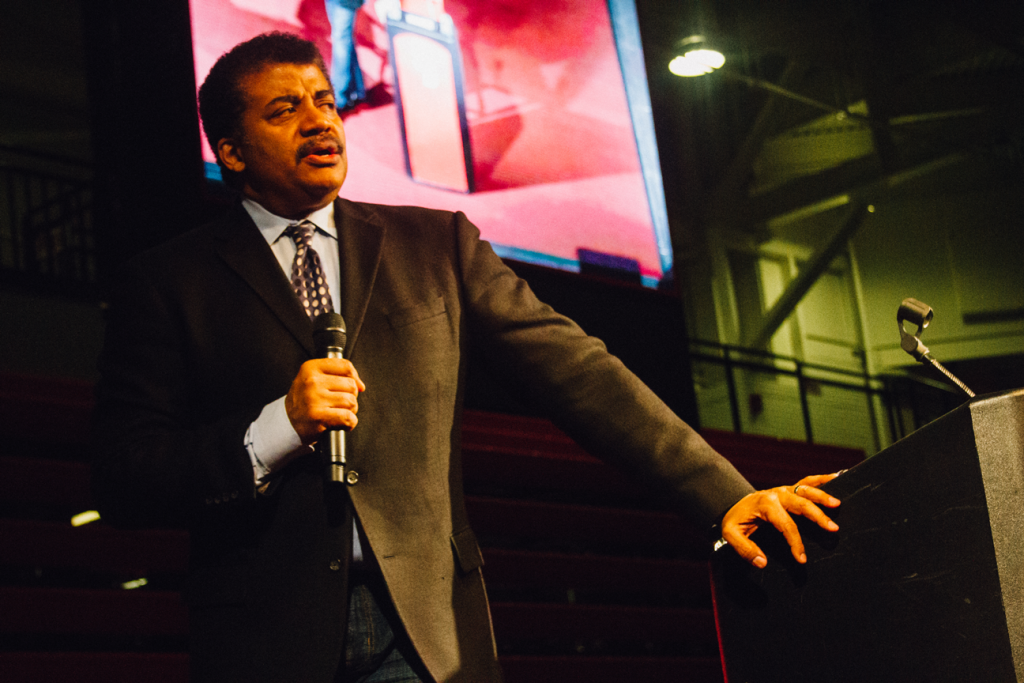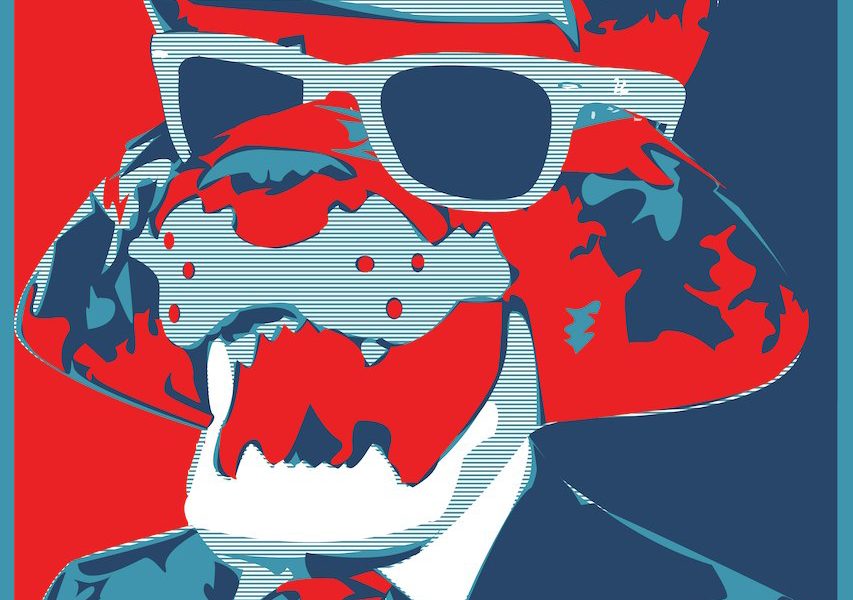Neil DeGrasse-Tyson is surprisingly animated in person.
The astrophysicist and preeminent science communicator (and part-time dancer), in his signature blazer and jeans, displayed his flexibility both physically and in his diverse interests as he reminded attendees that “The Sky is Not the Limit,” at Monday’s Graduate Student Association-hosted guest lecture of the same title at the Island Federal Credit Union Arena.
The house was packed-out for the famous physicist and according to Max Katz, the Vice President of Stony Brook’s GSO and one of the main coordinators of the event, around 2,200 tickets were sold.
While Tyson is known most for his work popularizing science on television — and Twitter — he took last night as an opportunity to share anecdotes which highlighted experiences that shaped his career and his love of the physics of space.
Tyson said that he appreciated the leeway to “just tell stories” about his life.
“I’ve known since I was nine that I liked space,” Tyson said, after recounting a trip to the Museum of Natural History’s Hayden Planetarium, where for the first time, as a native of the Bronx, he saw what the natural night sky looked like sans light pollution, and where he now works as the Director of the Department of Astrophysics.
He called it a “sick urban fact” that to this day, a beautiful night sky reminds him of the planetarium.
It was this interest that brought him to the point in his career that he is today.
“I am a servant to the public’s appetite for the universe,” said Tyson.
He then poked fun at other scientific fields, saying how they tend to make things more complicated, rather than simplifying. “Deoxyribonucleic acid… it’s so long that even you,” speaking to biologists, “have to abbreviate it.”
Highlighting the theme of his talk, Tyson quoted John F. Kennedy.
“We chose to go to the moon in this decade, and do the other things not because
they are easy but because they are hard.”
Tyson only related a small fraction of his speech back to concrete astrophysical concepts. Instead he spoke about scientific endeavors as whole, saying that you must “love the question itself” because answers are often elusive.
Though Tyson’s overarching message was reflective and encouraging, he delivered it with lighthearted and playful charm, sprinkling in punchy one-liners throughout.
“Recently, I was profiled — not by the police,” he said. Tyson was referencing an interview with The New Yorker, which described Tyson as a “mediocre student.” This, he said, was not the case.
While his grades were middling, he denounced those that judge someone’s eptitude by GPA, at one point asking University President Samuel Stanley to come to the front of the stage and inquiring when the last time someone asked him what his GPA was.
Stanley’s response? An extended pause.
“I did weird academic stuff outside of class that [my teachers] didn’t know about,” Tyson said.
Outside of the classroom, Tyson raised funds during “the golden age of dog-walking” — when there was no legal onus to pick up after the dogs — to purchase a telescope and a film camera that he developed pictures from in his converted-bathroom darkroom.
During his childhood his parents didn’t have a lot of money, but they nurtured his interests by buying what books they could afford about space and physics. And though he wasn’t exceptional at math, he said, “If you like something, you’ll like it even if you’re failing at it.”
He illustrated the point by comparing his winning wrestling record in high school with his losing record in college. Tyson also recalled a moment in his wrestling career when he was so exhausted that he remembered thinking, “‘I have no control over my pee’ — that’s how tired I was.” Tyson uses this memory as momentum to keep himself going when he becomes frustrated at the work he is doing. No matter how tired he was, he wasn’t tired enough to lose control.
The best example of this composure — and proof that passion is a powerful, driving force — was earning his PhD in astrophysics, he said.
In addition to his academic accomplishments, Tyson describes one of his crowning moments as when he was contacted for an accurate sky portrayal for a re-release of Titanic. “At least get the damn sky right!” he jested. As he relived the moment, he danced on stage in infectious satisfaction.
Though speaking at a STEM-focused university, anyone could have related to the life experiences he shared, proven by the underlying chuckle that murmured throughout the audience for most of the night. Tyson ended his talk, though, on a contemplative note, saying, “We have this delusion that to be good at something, it has to come easy to you.”




Comments are closed.